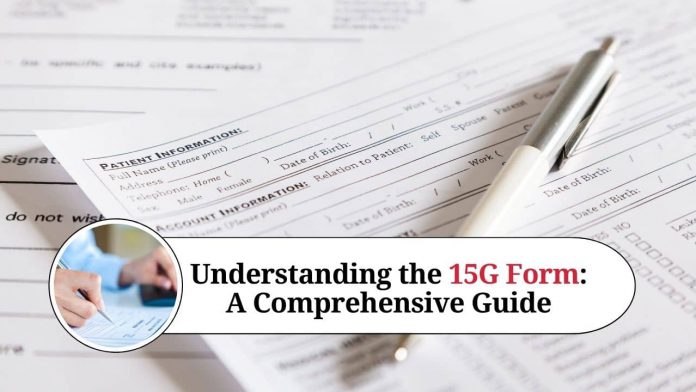Saving money is an important aspect of financial planning. However, paying taxes on the interest earned on our savings can be a significant burden. The Indian government provides taxpayers with an option to avoid this tax burden by submitting a 15G form to the bank.
What is a 15G Form?
Form 15G is a self-declaration form that can be submitted by an individual who is below 60 years of age and whose income falls below the taxable limit. It is a declaration stating that the individual’s total income for the financial year is below the taxable limit and hence, no tax should be deducted on the interest earned on his/her investments.
Eligibility Criteria To submit a 15G form, an individual must meet the following eligibility criteria:
- The individual must be below 60 years of age.
- The individual must be a resident Indian.
- The individual’s total income for the financial year must be below the taxable limit.
- The individual must have a Permanent Account Number (PAN) card.
How to Fill the 15G Form Filling the 15G form is a simple process.
The form can be obtained from the bank or downloaded from the Income Tax Department’s website. The following details must be filled in the form:
- Personal details such as name, address, and PAN.
- Details of the investments on which the interest is earned.
- Details of the income earned during the financial year for which the form is being submitted.
Once the form is filled, it must be signed and submitted to the bank.
Consequences of Incorrect Submission of 15G Form Submitting an incorrect 15G form can have serious consequences.
If an individual submits the form even when he/she is not eligible, it is considered to be a false declaration. The bank is required to deduct tax at source (TDS) on the interest earned and the individual may be liable for penalties or even prosecution.
Validity of 15G Form The 15G form is valid for one financial year. Hence, it must be submitted for every financial year in which an individual wants to avoid TDS on the interest earned.
Difference between 15G and 15H Forms
While the 15G form is meant for individuals below 60 years of age, the 15H form is meant for senior citizens who are 60 years and above. The eligibility criteria and the process of filling the form are similar to that of the 15G form.
Final Conclusion
The 15G form is an excellent option for individuals who want to avoid the tax burden on the interest earned on their savings. However, it is important to ensure that the form is submitted only when the individual meets the eligibility criteria. By understanding the process of filling the form and the consequences of incorrect submission, individuals can avoid any complications and make the most of this benefit provided by the government.
Read more useful content:
Frequently Asked Questions:
- What is Form 15G? Form 15G is a self-declaration form that is used by taxpayers to avoid TDS (Tax Deducted at Source) on certain incomes. It is typically used by individuals who are below the taxable limit and want to avoid the hassle of claiming a refund for TDS later on.
- Who can submit Form 15G? Form 15G can be submitted by individuals who are below the age of 60 and have an income that is below the taxable limit. Senior citizens above the age of 60 can use Form 15H.
- What types of income are covered under Form 15G? Form 15G can be used for income from fixed deposits, recurring deposits, and other interest-bearing deposits in banks or post offices. It can also be used for income from corporate bonds and debentures.
- How many times can Form 15G be submitted in a year? Form 15G can be submitted once in a financial year for each income source. So if you have multiple fixed deposits, you will need to submit Form 15G for each deposit.
- Can Form 15G be submitted online? Yes, many banks and post offices allow you to submit Form 15G online. You can also submit it physically by visiting the bank or post office and filling out the form.
- What happens if the information provided in Form 15G is incorrect? If the information provided in Form 15G is found to be incorrect, the taxpayer can be penalized. They may also be required to pay TDS and file a tax return.
- Is Form 15G applicable for non-residents? No, Form 15G is not applicable for non-residents. Non-residents are subject to TDS on all types of income.



















